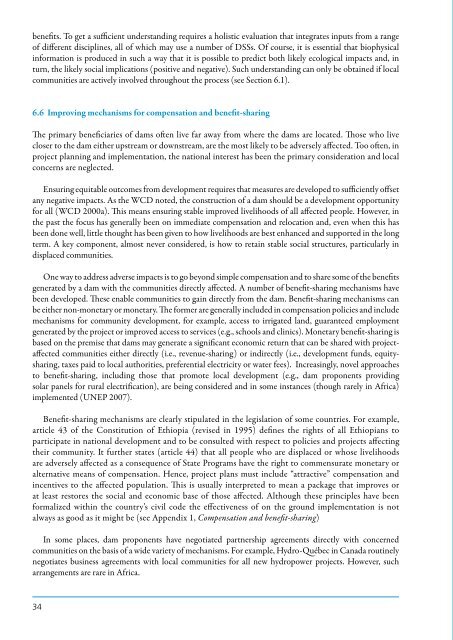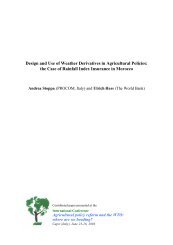Use of decision support systems to improve dam planning and dam ...
Use of decision support systems to improve dam planning and dam ...
Use of decision support systems to improve dam planning and dam ...
You also want an ePaper? Increase the reach of your titles
YUMPU automatically turns print PDFs into web optimized ePapers that Google loves.
enefits. To get a sufficient underst<strong>and</strong>ing requires a holistic evaluation that integrates inputs from a range<br />
<strong>of</strong> different disciplines, all <strong>of</strong> which may use a number <strong>of</strong> DSSs. Of course, it is essential that biophysical<br />
information is produced in such a way that it is possible <strong>to</strong> predict both likely ecological impacts <strong>and</strong>, in<br />
turn, the likely social implications (positive <strong>and</strong> negative). Such underst<strong>and</strong>ing can only be obtained if local<br />
communities are actively involved throughout the process (see Section 6.1).<br />
6.6 Improving mechanisms for compensation <strong>and</strong> benefit-sharing<br />
The primary beneficiaries <strong>of</strong> <strong>dam</strong>s <strong>of</strong>ten live far away from where the <strong>dam</strong>s are located. Those who live<br />
closer <strong>to</strong> the <strong>dam</strong> either upstream or downstream, are the most likely <strong>to</strong> be adversely affected. Too <strong>of</strong>ten, in<br />
project <strong>planning</strong> <strong>and</strong> implementation, the national interest has been the primary consideration <strong>and</strong> local<br />
concerns are neglected.<br />
Ensuring equitable outcomes from development requires that measures are developed <strong>to</strong> sufficiently <strong>of</strong>fset<br />
any negative impacts. As the WCD noted, the construction <strong>of</strong> a <strong>dam</strong> should be a development opportunity<br />
for all (WCD 2000a). This means ensuring stable <strong>improve</strong>d livelihoods <strong>of</strong> all affected people. However, in<br />
the past the focus has generally been on immediate compensation <strong>and</strong> relocation <strong>and</strong>, even when this has<br />
been done well, little thought has been given <strong>to</strong> how livelihoods are best enhanced <strong>and</strong> <strong>support</strong>ed in the long<br />
term. A key component, almost never considered, is how <strong>to</strong> retain stable social structures, particularly in<br />
displaced communities.<br />
One way <strong>to</strong> address adverse impacts is <strong>to</strong> go beyond simple compensation <strong>and</strong> <strong>to</strong> share some <strong>of</strong> the benefits<br />
generated by a <strong>dam</strong> with the communities directly affected. A number <strong>of</strong> benefit-sharing mechanisms have<br />
been developed. These enable communities <strong>to</strong> gain directly from the <strong>dam</strong>. Benefit-sharing mechanisms can<br />
be either non-monetary or monetary. The former are generally included in compensation policies <strong>and</strong> include<br />
mechanisms for community development, for example, access <strong>to</strong> irrigated l<strong>and</strong>, guaranteed employment<br />
generated by the project or <strong>improve</strong>d access <strong>to</strong> services (e.g., schools <strong>and</strong> clinics). Monetary benefit-sharing is<br />
based on the premise that <strong>dam</strong>s may generate a significant economic return that can be shared with projectaffected<br />
communities either directly (i.e., revenue-sharing) or indirectly (i.e., development funds, equitysharing,<br />
taxes paid <strong>to</strong> local authorities, preferential electricity or water fees). Increasingly, novel approaches<br />
<strong>to</strong> benefit-sharing, including those that promote local development (e.g., <strong>dam</strong> proponents providing<br />
solar panels for rural electrification), are being considered <strong>and</strong> in some instances (though rarely in Africa)<br />
implemented (UNEP 2007).<br />
Benefit-sharing mechanisms are clearly stipulated in the legislation <strong>of</strong> some countries. For example,<br />
article 43 <strong>of</strong> the Constitution <strong>of</strong> Ethiopia (revised in 1995) defines the rights <strong>of</strong> all Ethiopians <strong>to</strong><br />
participate in national development <strong>and</strong> <strong>to</strong> be consulted with respect <strong>to</strong> policies <strong>and</strong> projects affecting<br />
their community. It further states (article 44) that all people who are displaced or whose livelihoods<br />
are adversely affected as a consequence <strong>of</strong> State Programs have the right <strong>to</strong> commensurate monetary or<br />
alternative means <strong>of</strong> compensation. Hence, project plans must include “attractive” compensation <strong>and</strong><br />
incentives <strong>to</strong> the affected population. This is usually interpreted <strong>to</strong> mean a package that <strong>improve</strong>s or<br />
at least res<strong>to</strong>res the social <strong>and</strong> economic base <strong>of</strong> those affected. Although these principles have been<br />
formalized within the country’s civil code the effectiveness <strong>of</strong> on the ground implementation is not<br />
always as good as it might be (see Appendix 1, Compensation <strong>and</strong> benefit-sharing)<br />
In some places, <strong>dam</strong> proponents have negotiated partnership agreements directly with concerned<br />
communities on the basis <strong>of</strong> a wide variety <strong>of</strong> mechanisms. For example, Hydro-Québec in Canada routinely<br />
negotiates business agreements with local communities for all new hydropower projects. However, such<br />
arrangements are rare in Africa.<br />
34





